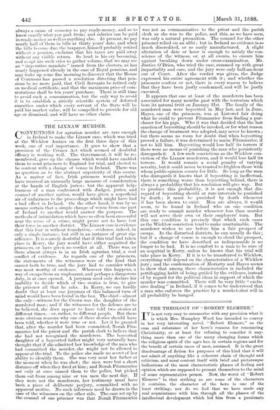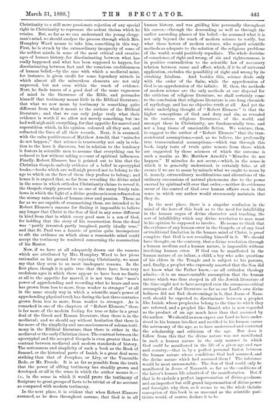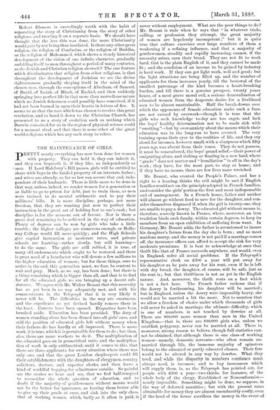THE THEOLOGY OF "ROBERT ELSMERE."
IT is not very easy to summarise with any precision what it is which Mrs. Humphry Ward has intended to convey in her very interesting novel, "Robert Elsmere," as the sum and substance of her hero's reasons for renouncing Christianity, or at least for refusing to consider it any- thing more than one of the many changing forms which the religious spirit of the ages has, in certain regions and for the benefit of certain races of men, assumed. It is the great disadvantage of fiction for purposes of this kind that it will not admit of anything like a coherent chain of thought and criticism, and must content itself with brief and picturesque indications of the most characteristic phases of feeling and opinion which are supposed to present themselves to the mind of some representative person. Now, the worst of "Robert Elsmere" is, that striking as are some of the characters it contains, the character of the hero is one of the least striking; nor do we feel that we have made any real acquaintance with him through all the phases of the intellectual development which led him from a passionate Christianity to a still more passionate rejection of any special right in Christianity to represent the ardent theism which he retains. But, so far as we can understand the yonng clergy- man's mind, we should analyse the process through which Mrs. Humphry Ward means to take him, something in this way. First, he is struck by the extraordinary incapacity of some of the noblest minds, in some of the most critical and creative ages of human history, for discriminating between what has really happened and what has been supposed to happen, for discriminating between fact and the voracious credulousness of human belief,—by the ease with which a medimval saint, for instance, is given credit for some legendary miracle in which almost all the miraculous elements are not only unproved, but not even within the reach of evidence. Next, he finds traces of a good deal of the same vagueness of mind in the literature of the Bible, and persuades himself that testimony meant little in the Biblical literature ; that what we now mean by testimony is something quite different from what it meant to the authors of the Biblical literature ; and that we can only judge truly what their evidence is worth if we allow not merely something, but (we had well-nigh said) everything, for that appetite for marvel and superstition which, in his opinion, coloured all they saw, and refracted the lines of all their records. Next, it is assumed, with the calm positiveness of Matthew Arnold, that "miracles do not happen ;" that science is trustworthy not only in rela- tion to the laws it discovers, but in relation to the tendency it fosters in scientific men to assume that everything can be reduced to law without taking account of spiritual influences. Finally, Robert Elsmere has it pointed out to him that the Christian Gospels embody evidence of a belief in apocryphal books,—books which are well-nigh proved not to belong to the age to which on the face of them they profess to belong ; and hence it is argued that, so far from revealing the divine mind in the sense in which orthodox Christianity claims to reveal it, the Gospels simply present to us one of the many lovely rain- bows in which the light of a divine goodness is seen refracted on the stormy rain-clouds of human error and passion. These, as far as we are capable of summarising them, are intended to be Robert Elsmere's reasons for finding it impossible to believe any longer that Christ is the Son of God in any sense different in kind from that in which every good man is a son of God, for holding that the story of his resurrection from the dead was "partly invented, partly imagined, partly ideally true," and that St. Paul was a fanatic of genius quite incompetent to sift the evidence on which alone a reasonable mind could accept the testimony he rendered concerning the resurrection of his Master.
Now, if we have at all adequately drawn out the reasons which are attributed by Mrs. Humphry Ward to her pious rationalist as his ground for rejecting Christianity, we must say that they seem to us most inadequate reasons. In the first place, though it is quite true that there have been very credulous ages in which there appear to have been no limits at all to the appetite for marvel, it is not true that "man's power of apprehending and recording what he hears and sees has grown from less to more, from weaker to stronger" at all in the same steady way in which a scientific man's power of apprehending physical truth has during the last three centuries grown from less to more, from weaker to stronger. As is remarked in one of the chapters of "Robert Elsmere," there is far more of the modern feeling for true or false in a great deal of the Greek and Roman literature, than there is in the mediEeval; and we should say without hesitation that there is far more of the simplicity and unconsciousness of solemn testi- mony in the Biblical literature, than there is either in the medileval or the early Christian times. The contrast between the apocryphal and the accepted Gospels is even greater than the contrast between medimval and modern standards of history. The seriousness and simplicity of such a book as the Book of Samuel, or the historical parts of Isaiah, is a great deal more striking than that of Josephus, or Livy, or the Venerable Bede, or Mr. Fronde. It is as far as possible from the truth that the power of sifting testimony has steadily grown and developed, at all in the sense in which the author means it,- i.e., in the sense in which it would prove the testimony of Scripture to great groups of facts to be trivial or of no account as compared with modem testimony.
In the next place, it is evident that when Robert Elsmere assumed, as he does throughout assume, that God is in all human history, and was guiding him personally throughout his career,—through the descending as well as through the earlier ascending phases of his belief,—he assumed what it is not only beyond the reach of modern science to verify, but what those heroes of modem science, who regard scientific methods as adequate to the solution of the religious problems of the world, would positively repudiate. The whole doctrine of conscience, of right and wrong, of sin and righteousness, is in positive contradiction to the scientific law of necessary relation between cause and effect, which, if it be of universal application, excludes the possibility of right and wrong by its crushing fatalism. And besides this, science deals only with the order of the finite, while the apprehension of God is an apprehension of the infinite If, then, the methods of modern science are the only methods at our disposal for the criticism of religious literature, we shall certainly come to the conclusion that religious literature is one long chronicle of mythology, and has no objective truth at all. And yet the whole underlying thought of "Robert Elsmere" is that the higher conceptions of God and duty and sin, as revealed in the various religious literatures of the world, and amongst these in Christianity, are fundamentally true, and not a long tissue of unscientific fiction. We venture, then, to suggest to the author of "Robert Elsmere" that the tran- scendental assumptions,—and, as we believe, the profoundly true transcendental assumptions,—which rum through this book, imply tests of truth quite remote from those which are suggested by those sciences of which the outcome is such a maxim as Mr. Matthew Arnold's "Miracles do not happen." If miracles do not occur,—which, in the sense in which it is generally understood, is certainly false, at all events if we are to mean by miracle what we ought to mean by it, namely, extraordinary modifications and alterations of the ordinary successions of natural phenomena due to the power exerted by spiritual will over that order,—neither do evidences occur of the control of God over human affairs even in that sense in which our author would strenuously maintain that they do.
In the next place, there is a singular confusion in the mind of the hero of this book as to the need for infallibility in the human organ of divine character and teaching, the sort of infallibility which any divine revelation to man must in his opinion be supposed to involve. He seems to think that the evidence of any human error in the Gospels, or of any local or traditional limitation in the human mind of Christ, is proof complete that God is not revealing himself in it. We should have thought, on the contrary, that a divine revelation through a human medium and a human nature, is impossible without involving human error. If God can be manifested in the human nature of an infant, a child, a boy who asks questions of his elders in the Temple and is subject to his parents, and, finally, a prophet who expressly asserted that the Son did not know what the Father knew,—as all orthodox theology admits,—it is an unaccountable assumption that the human nature which was thus steeped in all the Jewish literature of the time ought not to have accepted even the erroneous critical assumptions of that literature so far as our Lord's own divine holiness did not find shortcomings in it, that Jesus of Naza- reth should be expected to discriminate between a prophet like Isaiah, whose prophecies belong to the time to which they are referred, and a prophet like Daniel, who is now regarded as the product of an age much later than that assumed by the author. We should as soon expect our Lord to have under- stood in his human intellect and rectified in his human career the astronomy of the age, as to have understood and corrected the scholarship and criticism of the age. But does it follow from this that the divine nature was not manifested in such a human nature in the only manner in which God could be manifested in the life of a given age and race and country,—that is, by a perfect personal fusion between the human nature whose conditions God had assumed, and the divine nature which had assumed them P The inference would be most unreasonable. The Son of God could only be manifested in Jesus of Nazareth so far as the conditions of the latter's human life admitted of the manifestation. But if that is to exclude a perfect impersonation of divine goodness, and an imperfect but still grand impersonation of divine power and foresight, why then, as it seems to us, the whole theistic conception of this book is as unsound as the scientific posi- tivists would, of course, declare it to be. Robert Elsmere is exceedingly wroth with the habit of separating the story of Christianity from the story of other religions, and treating it on a separate basis. We should have thought that the less this was done, the more Christianity would gain by not being thus insulated. Is there any other great religion, the religion of Confucius, or the religion of Buddha, or the religion of Ma,hommed, which shows a steady historical development of the vision of one infinite character, gradually unfolding itself to man throughout a period of many centuries, as the Jewish and Christian religion shows it ? The one feature which discriminates that religion from other religions, is that throughout the development of Judaism we see the divine righteousness gradually shaping itself in the mind of the chosen race, through the conceptions of Abraham, of Samuel, of David, of Isaiah, of Micah, of Ezekiel, and then suddenly springing into perfect life in that more than marvellous nature which no Jewish fishermen could possibly have conceived, if it had not been burned in upon their hearts in letters of fire. It seems to us that the race which was chosen to receive this great .revelation, and to hand it down to the Christian Church, has .presented to us a story of evolution such as nothing which Darwin conceived for us in the region of physical science could for a moment rival, and that there is none other of the great world-religions which has any such story to relate.




































 Previous page
Previous page